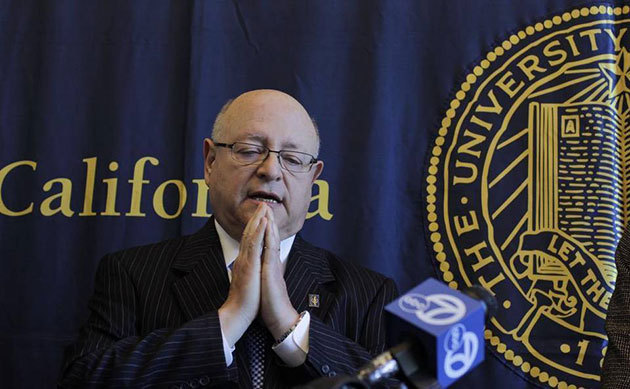UC paid former president Mark Yudof $546,000 in the year after he resigned

By Phillip Reese
University of California paid former president Mark Yudof $546,000 in 2014 – the year after he stepped down from his post, according to salary data released by the UC system this week.
Yudof served as UC president for five years before resigning in late summer 2013 to become a law professor at UC Berkeley. He was replaced by Janet Napolitano, former secretary of the U.S. Department of Homeland Security and governor of Arizona.
At UC Berkeley, Yudof co-instructed one class for one semester in 2014, according to a faculty profile page on the university’s website. The class met once a week for three hours.
Yudof benefited from a UC policy that allows high-ranking administrators to receive a year of pay if they are preparing to teach again. He took that pay and taught for two semesters, co-instructing another class in spring 2015. He retired from teaching in June, officials said, and no longer draws a salary from UC Berkeley. Berkeley Law’s website lists Yudof as a professor emeritus.
UC spokeswoman Dianne Klein said in an email that “when UC presidents leave to teach at a UC campus, they customarily receive a year of sabbatical pay under regents’ policy. Yudof’s sabbatical pay lasted from Sept. 2013 to Sept. 2014.” Yudof’s sabbatical pay came directly from state funds, she said.
Yudof reaffirmed that information in an email, saying, “for 2013-14, I was receiving my (president’s office) compensation for a leave to prepare to re-enter teaching. This is the typical arrangement for presidents and chancellors who leave administration and prepare to begin teaching again.” Yudof said he also received pay for his teaching at UC Berkeley in the 2014-15 academic year. He declined further comment.
445: Number of UC employees earning more than $500,000 in 2014, according to data released by the college system
The University of California Student Association Acting President Kevin Sabo called Yudof’s pay in 2014 “another episode of embarrassment in terms of executive compensation.” He noted that other prominent professors such as former U.S. Secretary of Labor Robert Reich, who teaches public policy at UC Berkeley, earned far less than Yudof last year.
“Yudof should establish a scholarship fund with this money and give it back to the system,” Sabo said.
UC executive compensation has been a hot topic for years. The debate recently heated up again as UC officials this year threatened to raise tuition if the state did not budget more money to the system. Assemblyman Roger Hernández, D-Baldwin Park, introduced a bill shortly afterward that would have capped compensation for any UC employee at $500,000. That bill is stalled in committee; it last came to a vote in April.
Sabo said the UC system needs to revisit and possibly abolish its practice of paying UC presidents for a sabbatical after they leave. Such policies, he said, make it hard to convince legislators that UC needs more funding to help students.
“Time after time, it’s ‘Why should we give these resources to the UC when it just goes to executive compensation?’ ” Sabo said, summarizing what he said he hears from lawmakers.
Assemblyman Kevin McCarty, D-Sacramento, said he was disappointed to learn of Yudof’s 2014 pay. He said UC officials pleaded poverty when asked to allocate more money for California students this year.
“This is yet another example of the University of California finding money for executive compensation at the same time they say they can’t find money for enrollment for California residents,” said McCarty, who chairs the Assembly budget subcommittee on education finance. “It makes you scratch your head.”
Yudof should establish a scholarship fund with this money and give it back to the system.
UC Student Association Acting President Kevin Sabo
Todd Stenhouse, spokesman for American Federation of State, County and Municipal Employees Local 3299, which represents thousands of UC’s blue-collar workers, said Yudof oversaw a system that often did little to help rank-and-file employees.
“It is sadly ironic that the president who presided over the explosion of executive excess – of skyrocketing tuition and skyrocketing poverty among UC’s lowest-paid workers – gets paid half a million dollars for not working,” he said.
Yudof was one of 445 UC employees earning at least $500,000 last year, according to the new data. The year prior, 387 UC employees made that much.
The vast majority of UC employees earning more than $500,000 a year are doctors or administrators at UC hospitals, or coaches for major UC athletic teams.
Yudof made more than any chancellor at UC’s 10 campuses in 2014, with the exception of UC San Francisco, a stand-alone health-sciences school. He made nearly as much as Napolitano, who earned $585,000 in 2014.
Klein said Yudof earned $591,000 in annual base salary, and continued to earn sabbatical pay during the 2013-14 academic year that immediately followed his retirement. During the 2014-15 academic year, UC Berkeley paid him $315,000 for his position at the law school. The median pay for UC Berkeley law professors last year was about $310,000.
Earlier this month, the University of California approved 3 percent raises for 15 top administrators. Among those to receive the salary increases are five campus leaders, including UC Davis Chancellor Linda P.B. Katehi. She will make $424,360.
[Source]: Sacramento Bee


